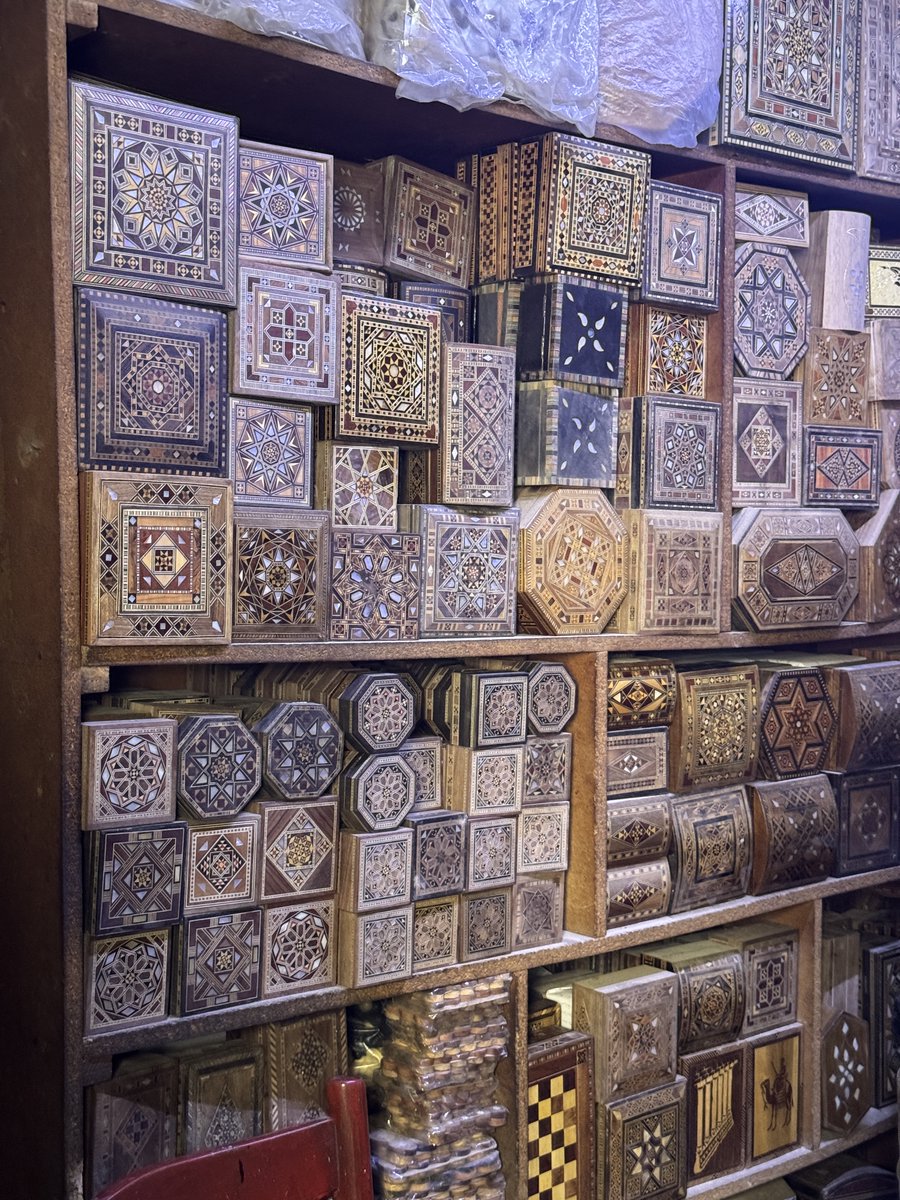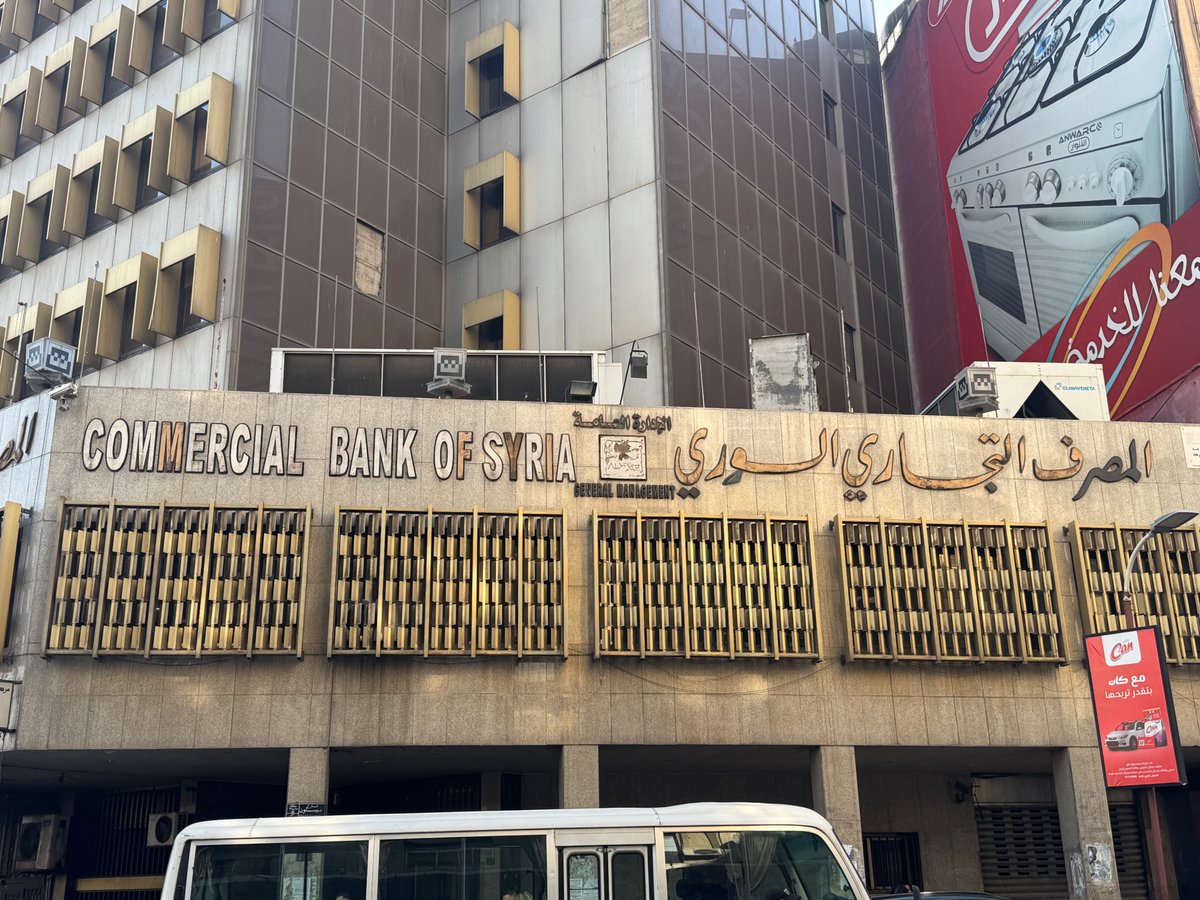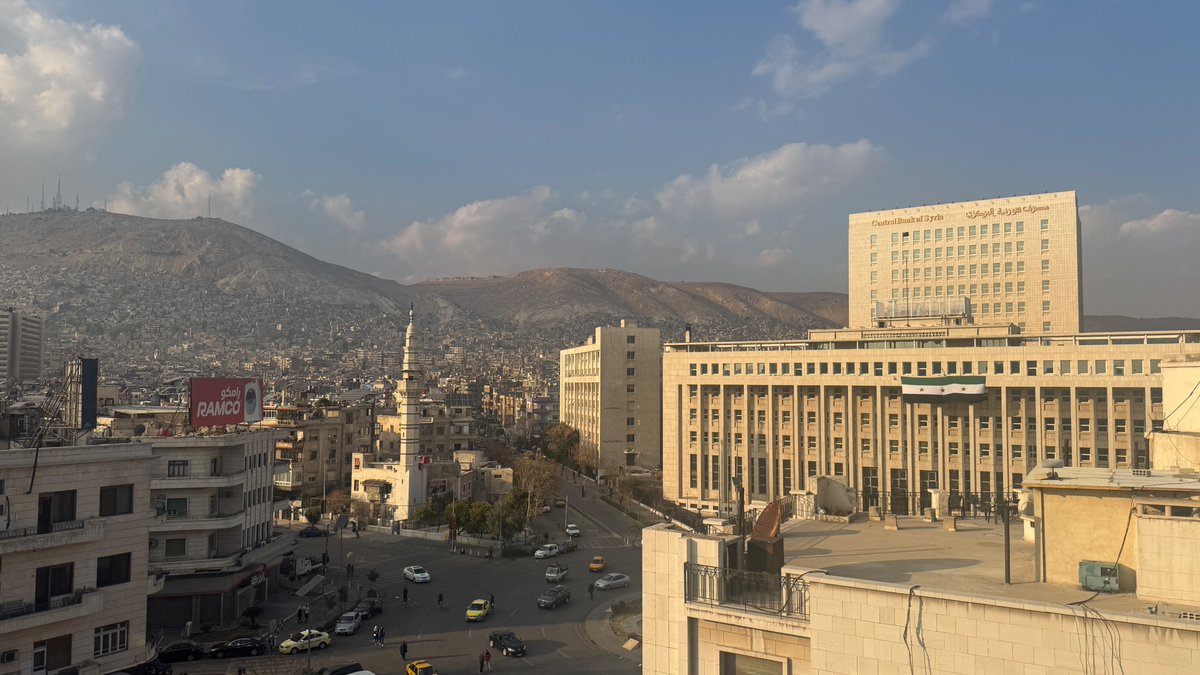I just spent 17 days in Damascus, from January 14 to January 30. I had never imagined I would learn this much in such a short period of time.
I know it’s a cliché, but in this (long) thread 1️⃣🧵, I want to reflect on these two weeks that—perhaps selfishly—brought me so much.
I hope that one day, I’ll be able to give back to Syria for all it has given me.
I know it’s a cliché, but in this (long) thread 1️⃣🧵, I want to reflect on these two weeks that—perhaps selfishly—brought me so much.
I hope that one day, I’ll be able to give back to Syria for all it has given me.

2️⃣ Most of the people I spoke with (in English, Arabic, and (broken) Turkish) were regular, everyday individuals—mostly poor or extremely poor. Predominantly Sunni Arabs, but also some Alawites, Christians, and a few Turkmens.
My comments and reflections below are in no way, shape, or form linked to formal research. My questions were driven by curiosity and a desire to understand Syria and its people better, with the aim of speaking and writing about the country with greater precision and a deeper understanding of conditions on the ground. As such, I'll be sharing thoughts rather than anything else. So do not expect any actual academic, technical, or journalistic feedback.
(I apologize in advance for the (probably) disconnected and raw thoughts.)
My comments and reflections below are in no way, shape, or form linked to formal research. My questions were driven by curiosity and a desire to understand Syria and its people better, with the aim of speaking and writing about the country with greater precision and a deeper understanding of conditions on the ground. As such, I'll be sharing thoughts rather than anything else. So do not expect any actual academic, technical, or journalistic feedback.
(I apologize in advance for the (probably) disconnected and raw thoughts.)
3️⃣ After successfully managing to enter the country—not an easy feat by any means—what struck me the most were the Syrians themselves. There is this palpable feeling that, even from abroad, Syrians have regained their dignity after 14 years of war. They are no longer just refugees, an unwanted people, a burden. They have shed the label of second-class world citizens.
Before entering Syria, in Turkey for instance, you can already sense that Syrians, even though they are still outside Syria, no longer feel like refugees. They are freer, more confident, prouder of themselves.
The same is true for Syrians in Syria. Many told me, “Now we will be able to travel, to go to Europe freely. People will see that we are not terrorists and refugees.” There is a strong desire to show the world who Syrians really are—to break free from the heavy prejudice of the past 14 years.
Others told me they are looking forward to welcoming tourists to showcase Syrian hospitality, food, and culture.
That ever-present sense of sadness, suffering, and helplessness seems to have disappeared—or at least subsided. You can feel it when you speak to any Syrian before or after December 8. In Syria, too, several people told me that the air was thick with fear before, but now it is gone.
Today, Syrians are eager to discover the world, to engage with people. Just look at how packed the civil society-organized conferences in Damascus have been. Syrians are eager to learn about their own country, too.
What a resilient people.
Before entering Syria, in Turkey for instance, you can already sense that Syrians, even though they are still outside Syria, no longer feel like refugees. They are freer, more confident, prouder of themselves.
The same is true for Syrians in Syria. Many told me, “Now we will be able to travel, to go to Europe freely. People will see that we are not terrorists and refugees.” There is a strong desire to show the world who Syrians really are—to break free from the heavy prejudice of the past 14 years.
Others told me they are looking forward to welcoming tourists to showcase Syrian hospitality, food, and culture.
That ever-present sense of sadness, suffering, and helplessness seems to have disappeared—or at least subsided. You can feel it when you speak to any Syrian before or after December 8. In Syria, too, several people told me that the air was thick with fear before, but now it is gone.
Today, Syrians are eager to discover the world, to engage with people. Just look at how packed the civil society-organized conferences in Damascus have been. Syrians are eager to learn about their own country, too.
What a resilient people.
4️⃣ Yet, not everything is good. Syria and Syrians still suffer immensely. A ten-minute walk anywhere in Damascus makes that painfully clear.
There is so much work to do. Syria is in ruins. It won’t take a few months or even a few year—it will take decades.
This country is desperately poor. You can’t walk five meters without a young child or an elderly woman begging or trying to sell you tissues. Ten-year-old kids look like they’re already in their forties—shaved heads, cuts, bruises, and scars on their faces, covered in dirt, smoking. The level of poverty is beyond words.
The first shawarma I ate during my first day, only a few hours entering Syria was probably one of my worst experience. You are just barely seated outside that you are surrounded by a bunch of little kids asking for a bite of your shawarma, two fries, or a sip of your pepsi. This was shocking. Not even asking for money but food. Then, in the seconds following you leaving your table and leaving, you see these same kids swarming your table to eat the crumbs of what remained from your meal.
The number of disabled persons is also shocking. At every corner, people with a foot, an arm, or both missing begging for something. I can't even begin to imagine what being disabled in such a country is like.
I urge every person coming to Syria to “support” the country—international actors, foreign delegations, NGOs, journalists—to step out of their 4- or 5-star hotels, to leave their private transfers between meetings and conferences, and just walk outside. See Syria for what it really is.
There is so much work to do. Syria is in ruins. It won’t take a few months or even a few year—it will take decades.
This country is desperately poor. You can’t walk five meters without a young child or an elderly woman begging or trying to sell you tissues. Ten-year-old kids look like they’re already in their forties—shaved heads, cuts, bruises, and scars on their faces, covered in dirt, smoking. The level of poverty is beyond words.
The first shawarma I ate during my first day, only a few hours entering Syria was probably one of my worst experience. You are just barely seated outside that you are surrounded by a bunch of little kids asking for a bite of your shawarma, two fries, or a sip of your pepsi. This was shocking. Not even asking for money but food. Then, in the seconds following you leaving your table and leaving, you see these same kids swarming your table to eat the crumbs of what remained from your meal.
The number of disabled persons is also shocking. At every corner, people with a foot, an arm, or both missing begging for something. I can't even begin to imagine what being disabled in such a country is like.
I urge every person coming to Syria to “support” the country—international actors, foreign delegations, NGOs, journalists—to step out of their 4- or 5-star hotels, to leave their private transfers between meetings and conferences, and just walk outside. See Syria for what it really is.
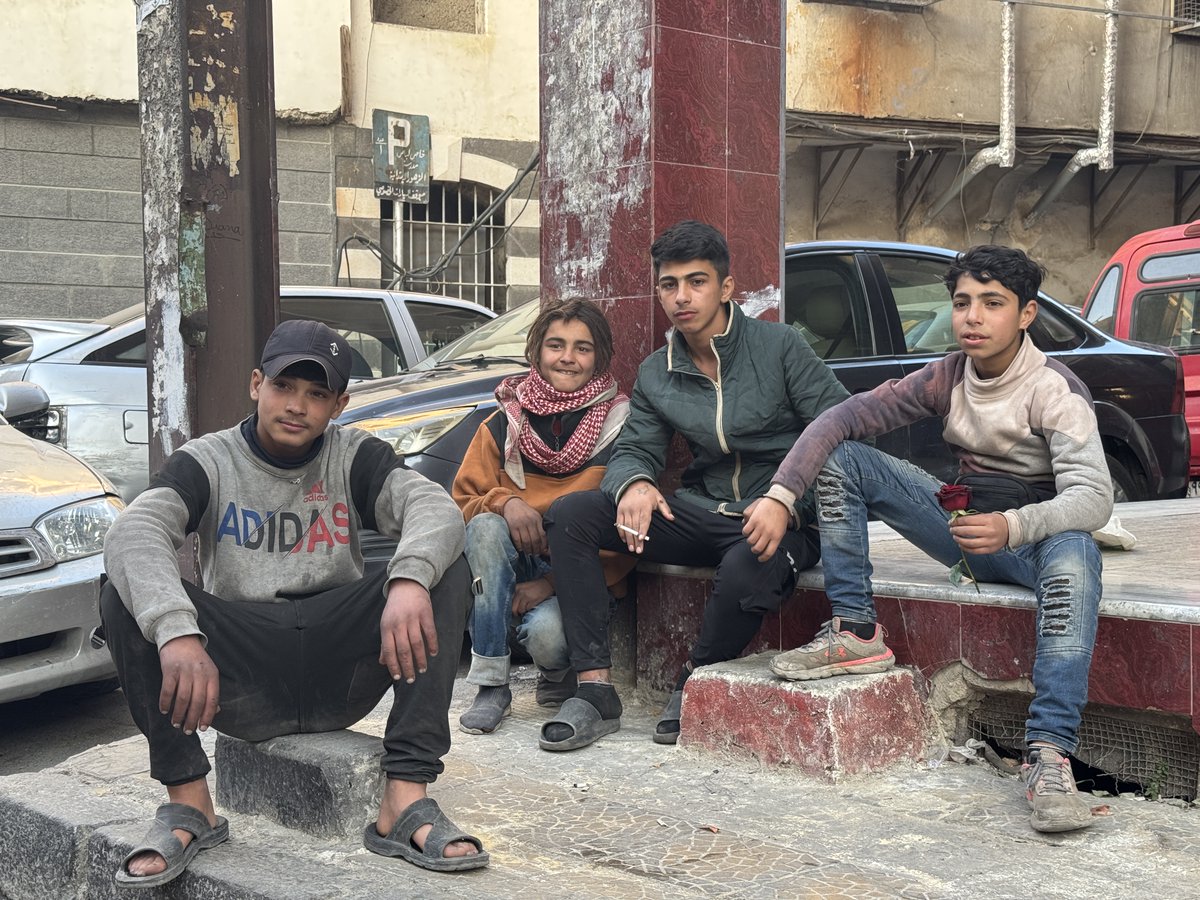
5️⃣ I'll digress a bit here but, in fact, the detachment I’ve seen from some people is quite disturbing. Syria is not just a backdrop for diplomats and foreign journalists to build their careers.
Now that the country is accessible again after 14 years, everyone and their grandmother is coming to Syria—including people who have no real knowledge of the country and are just here because it’s trending. One foreign journalist even asked if he could put his credit card in an ATM to withdraw money. Really?
By the way, on the topic of foreigners and journalists entering Syria: pay your fixers properly and stop complaining.
I’m probably not going to make many friends saying this, but some of you arrive with zero understanding of what’s actually happening in Syria, rely on a fixer who does 90% of the work for you, and then complain that they’re asking for too much because they charge $50–100 a day. Foreign outlets should just hire Syrian journalists on the ground.
Syria is badly in need of a Fixers Syndicate.
Now that the country is accessible again after 14 years, everyone and their grandmother is coming to Syria—including people who have no real knowledge of the country and are just here because it’s trending. One foreign journalist even asked if he could put his credit card in an ATM to withdraw money. Really?
By the way, on the topic of foreigners and journalists entering Syria: pay your fixers properly and stop complaining.
I’m probably not going to make many friends saying this, but some of you arrive with zero understanding of what’s actually happening in Syria, rely on a fixer who does 90% of the work for you, and then complain that they’re asking for too much because they charge $50–100 a day. Foreign outlets should just hire Syrian journalists on the ground.
Syria is badly in need of a Fixers Syndicate.
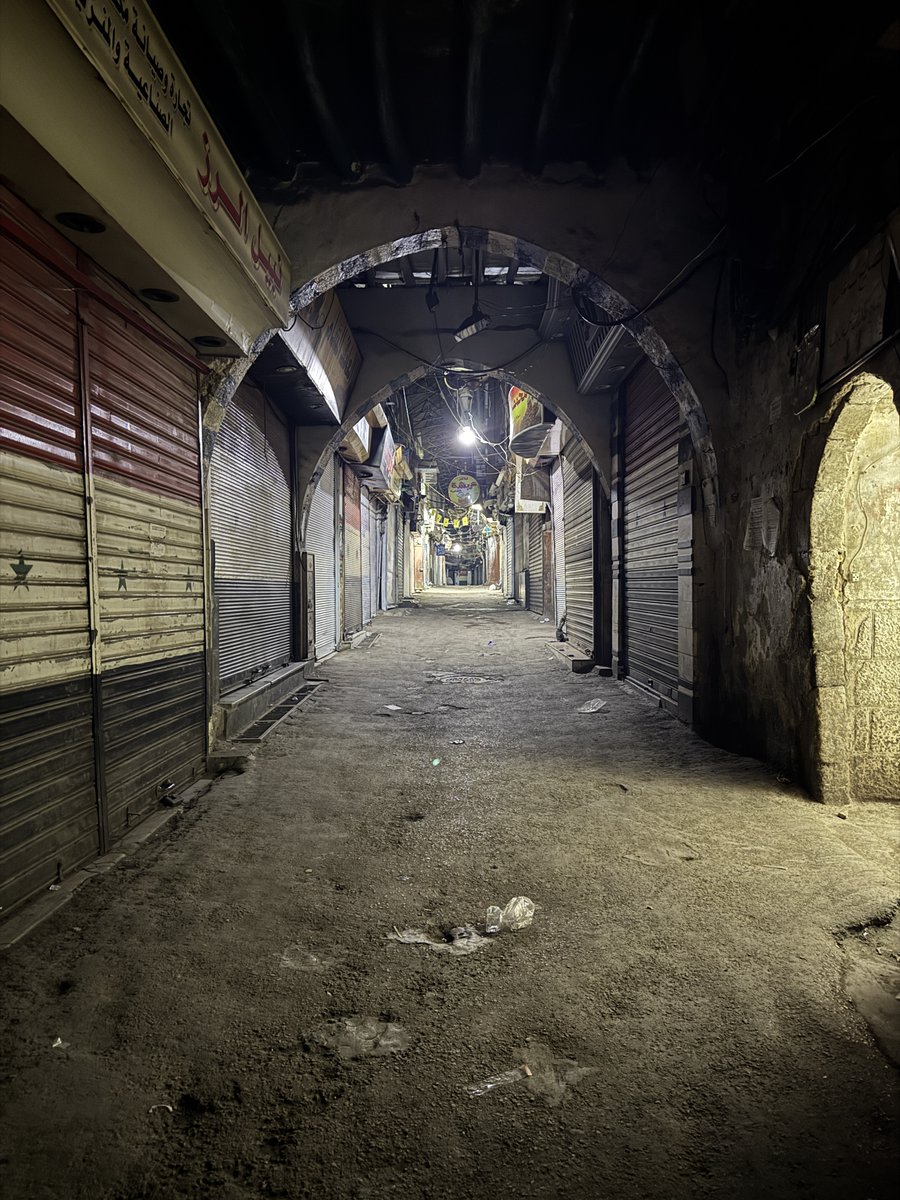
6️⃣ Back to the economic situation, many ordinary people had expected things to improve quickly after the regime’s collapse, but that hasn’t happened.
Many complained that prices remain high, some even rising since the regime's collapse. “They told us everything would be okay once Assad was gone, but prices are still high, and we are still struggling,” one person told me.
While this expectation might seem naïve to experts, it’s a widely held belief among the population. Some told me they’ll wait three months before judging the new government’s performance—before their frustration turns more public. The authorities will have to take this into account… and Ahmad Al-Sharaa’s silence toward Syrians will only add to their discontent.
We have already seen protests in Idlib over rising prices. This could well spread to other areas of Syria. However, the situation seems stable for the moment and most people seem happy enough with the country's direction.
Many complained that prices remain high, some even rising since the regime's collapse. “They told us everything would be okay once Assad was gone, but prices are still high, and we are still struggling,” one person told me.
While this expectation might seem naïve to experts, it’s a widely held belief among the population. Some told me they’ll wait three months before judging the new government’s performance—before their frustration turns more public. The authorities will have to take this into account… and Ahmad Al-Sharaa’s silence toward Syrians will only add to their discontent.
We have already seen protests in Idlib over rising prices. This could well spread to other areas of Syria. However, the situation seems stable for the moment and most people seem happy enough with the country's direction.
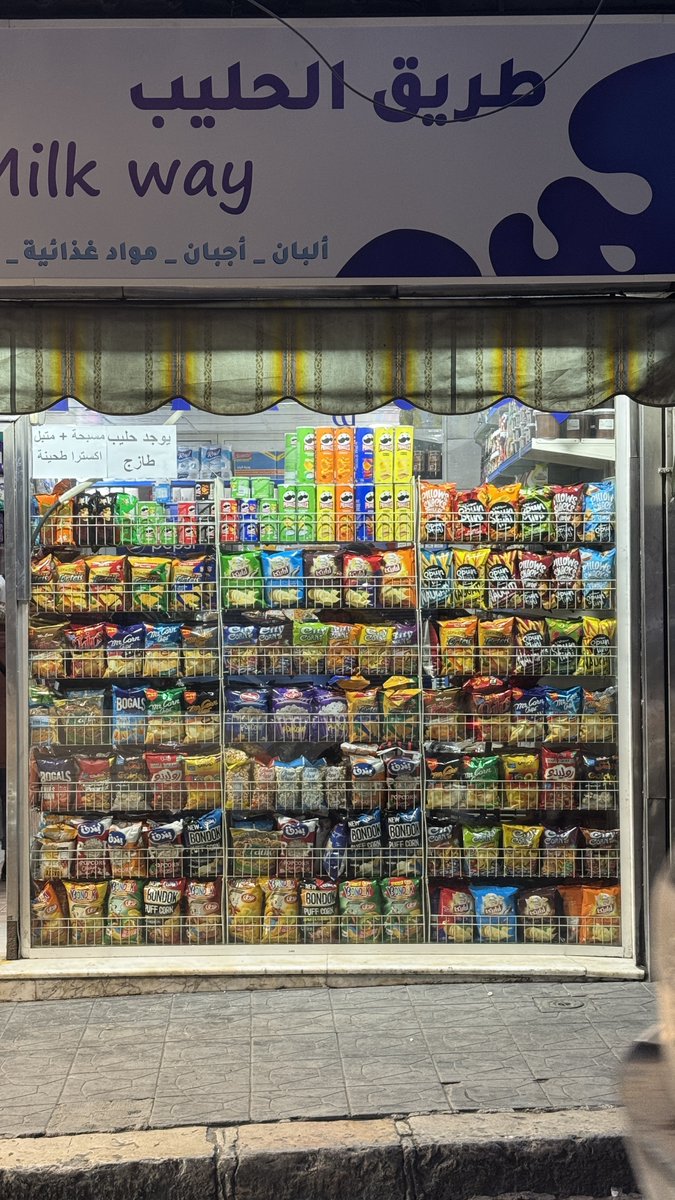
7️⃣ Beyond poverty, the pollution is awful. Staying in popular areas of Damascus gives you a real sense of what industrial England in the 19th century must have been like. Everybody is sick and coughing.
I am begging the international community to rebuild Syria with solar panels, electric cars, and tobacco prevention campaigns. In the long run, that would probably cost less than the burden of healthcare costs.
These awful 20-year-old Iranian Saipa cars, though durable, are killing the population. The same goes for private diesel generators. The thick layer of smog across the city is shocking. And smoking—it’s everywhere, worse than in any country I’ve ever been to. Amazing if you’re a smoker, a nightmare if you’ve quit.
I am begging the international community to rebuild Syria with solar panels, electric cars, and tobacco prevention campaigns. In the long run, that would probably cost less than the burden of healthcare costs.
These awful 20-year-old Iranian Saipa cars, though durable, are killing the population. The same goes for private diesel generators. The thick layer of smog across the city is shocking. And smoking—it’s everywhere, worse than in any country I’ve ever been to. Amazing if you’re a smoker, a nightmare if you’ve quit.
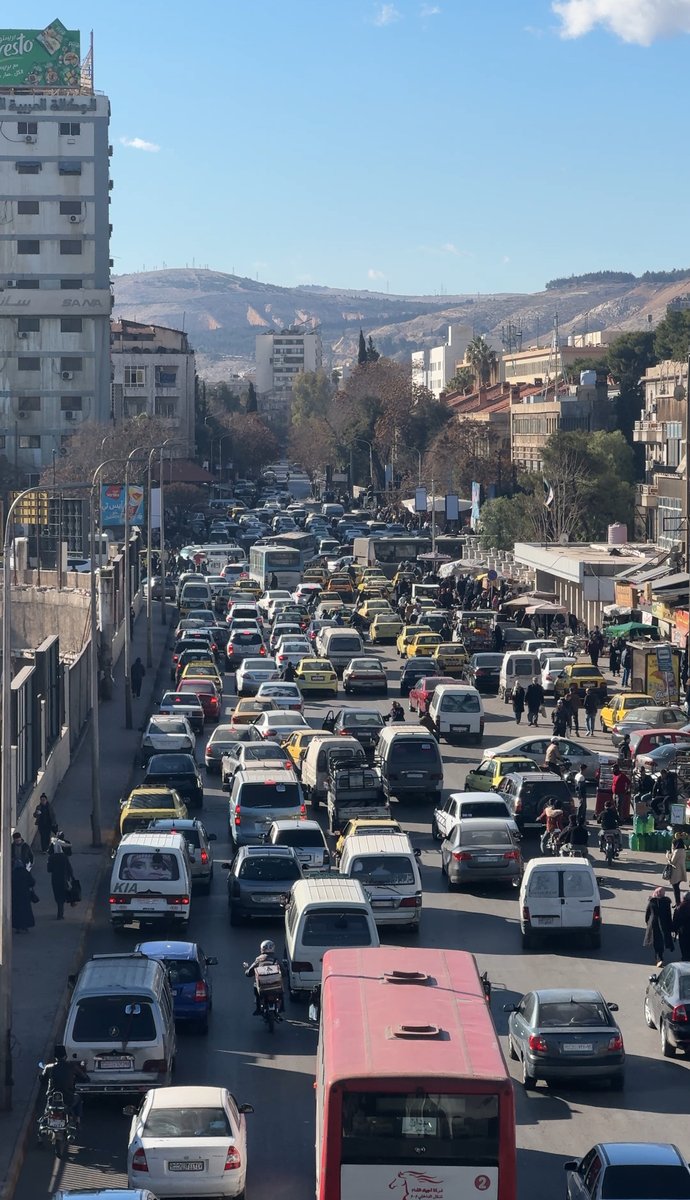
8️⃣ Though I was usually the one asking questions, now that Syrians can finally talk, they are very curious, too.
They ask about the outside world, but also about Syria itself. When I introduced myself as working on political economy, they asked me many questions about their own country—about sanctions, the economy, how long recovery will take. Many basic questions... which shows the extent to which Syrians have been deprived of knowledge about their own country.
Actually, it is amazing to see the extent to which the civil society is participating to events, conferences, seminars. Each and everyone one of them that I attended were absolutely packed!
They ask about the outside world, but also about Syria itself. When I introduced myself as working on political economy, they asked me many questions about their own country—about sanctions, the economy, how long recovery will take. Many basic questions... which shows the extent to which Syrians have been deprived of knowledge about their own country.
Actually, it is amazing to see the extent to which the civil society is participating to events, conferences, seminars. Each and everyone one of them that I attended were absolutely packed!
9️⃣ Something that surprised much a lot was just how popular Turkey has become. Though this was always assumed, witnessing it firsthand was striking. The soft power Turkey has accumulated in Syria is immense. Many Syrians—Arabs, not just Turkmens—now speak Turkish, admire Turkey, and express gratitude to Erdoğan for his role in helping Syrians and Syria get rid of Assad. Regardless of how accurate this perception is, Turkey’s influence is undeniable.
There is near-universal agreement that Turkey will play a leading role in rebuilding Syria. Of course, since the unification of Idlib with former regime-held areas, Turkish products have flooded Syrian markets in Damascus.
The U.S., EU, and Gulf countries are sometimes mentioned, but Turkey is always mentioned.
There is near-universal agreement that Turkey will play a leading role in rebuilding Syria. Of course, since the unification of Idlib with former regime-held areas, Turkish products have flooded Syrian markets in Damascus.
The U.S., EU, and Gulf countries are sometimes mentioned, but Turkey is always mentioned.
🔟 Regarding safety, Damascus feels very safe. Sure, there are many (very young) men armed with AK-47s everywhere, which is unsettling, but the sense of security is strong. Large outdoor gatherings and demonstrations are secured by HTS. From what I observed, HTS members would stop other armed men to ask for their affiliation if they didn’t immediately recognize them—especially those wielding AKs in civilian clothes.
Nighttime is a bit weirder. Barely any civilians are out past 2 AM, and security is everywhere. The first time, I wondered if there was a curfew… At every corner or intersection, there are guards. Yet, I never felt threatened. Actually, nobody even asked me where I was going, even late at night.

Nighttime is a bit weirder. Barely any civilians are out past 2 AM, and security is everywhere. The first time, I wondered if there was a curfew… At every corner or intersection, there are guards. Yet, I never felt threatened. Actually, nobody even asked me where I was going, even late at night.

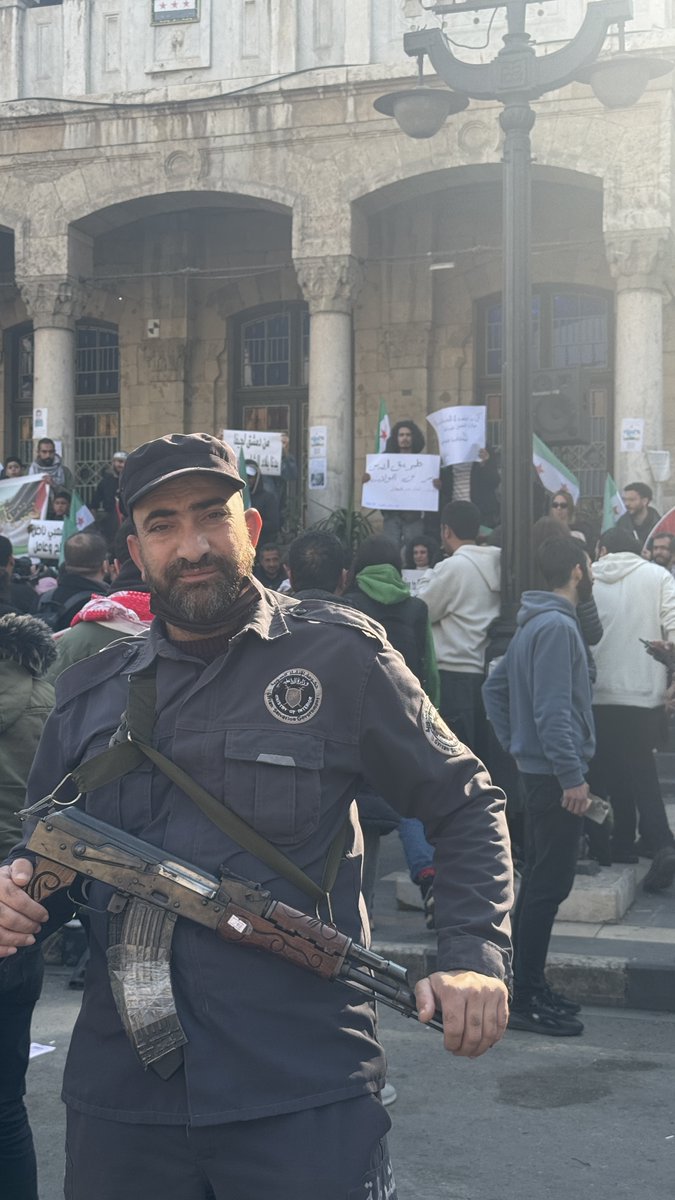
1️⃣1️⃣ Still on safety—most people I spoke with feel safe, including minorities, though the consensus is weaker. Christians and Druze seem okay with the current administration. Alawites, less so. The stories of what happened on Dec 8 and the days that followed are grim—intimidation and beatings. This seems to have subsided.
Many Alawites in Damascus don’t feel particularly unsafe, but they acknowledge that things could turn bad for them at any moment. I was asked whether asylum to the EU is still an option for Syrians.
The Christians I spoke with seem to feel slightly safer than Alawites, I'd say, though they, too, recognize that things could take a turn.
Many Alawites in Damascus don’t feel particularly unsafe, but they acknowledge that things could turn bad for them at any moment. I was asked whether asylum to the EU is still an option for Syrians.
The Christians I spoke with seem to feel slightly safer than Alawites, I'd say, though they, too, recognize that things could take a turn.
1️⃣2️⃣Others have also wondered where the international community is. Now that Assad is gone, where is the aid? More broadly, they ask: where are the Europeans? Why are sanctions still in place? Why is nobody helping them?
They are critical of the fact that all these foreign delegations are meeting with the new government but do not seem to be doing much to support it. By extension, they also complain that Ahmad Al-Sharaa has been meeting with all these delegations, acting as Syria’s leader, yet has not spoken directly to the people (as of January 30).
There is no real consensus on this last point. Some told me that he doesn’t need to speak since he is not the actual president, while others argued that he must address the people to reassure them and, as the de facto leader, to explain the direction he intends to take Syria.
They are critical of the fact that all these foreign delegations are meeting with the new government but do not seem to be doing much to support it. By extension, they also complain that Ahmad Al-Sharaa has been meeting with all these delegations, acting as Syria’s leader, yet has not spoken directly to the people (as of January 30).
There is no real consensus on this last point. Some told me that he doesn’t need to speak since he is not the actual president, while others argued that he must address the people to reassure them and, as the de facto leader, to explain the direction he intends to take Syria.
1️⃣3️⃣ Another significant issue that I encountered was the topic of transitional justice and national reconciliation.
In a striking parallel with the Second World War, Syrian society is deeply fragmented: those with the Assad regime and those against it. However, it is not a matter of black or white. What about those who had to work with the regime to survive? What about those who collaborated with the regime but later turned to the opposition? What about NGOs and humanitarian workers who had to engage with the regime in order to also work with and support the population?
So much mutual resentment.
I witnessed a heated discussion between a former political security officer who had joined the opposition and a member of an NGO with ties to the Presidential Palace, each blaming the other for working with the regime. Then you have Syrians in formerly opposition-held areas who blame both of them for collaborating with the regime.
My fear is that this ultimately leads to the fragmentation of society along the lines of those who worked extensively, moderately, or not at all with the former regime—with the latter being favored and the former marginalized. If so, this will lead to significant conflict and resentment in the long term.
An unsolvable dilemma that will take decades to resolve.
In a striking parallel with the Second World War, Syrian society is deeply fragmented: those with the Assad regime and those against it. However, it is not a matter of black or white. What about those who had to work with the regime to survive? What about those who collaborated with the regime but later turned to the opposition? What about NGOs and humanitarian workers who had to engage with the regime in order to also work with and support the population?
So much mutual resentment.
I witnessed a heated discussion between a former political security officer who had joined the opposition and a member of an NGO with ties to the Presidential Palace, each blaming the other for working with the regime. Then you have Syrians in formerly opposition-held areas who blame both of them for collaborating with the regime.
My fear is that this ultimately leads to the fragmentation of society along the lines of those who worked extensively, moderately, or not at all with the former regime—with the latter being favored and the former marginalized. If so, this will lead to significant conflict and resentment in the long term.
An unsolvable dilemma that will take decades to resolve.
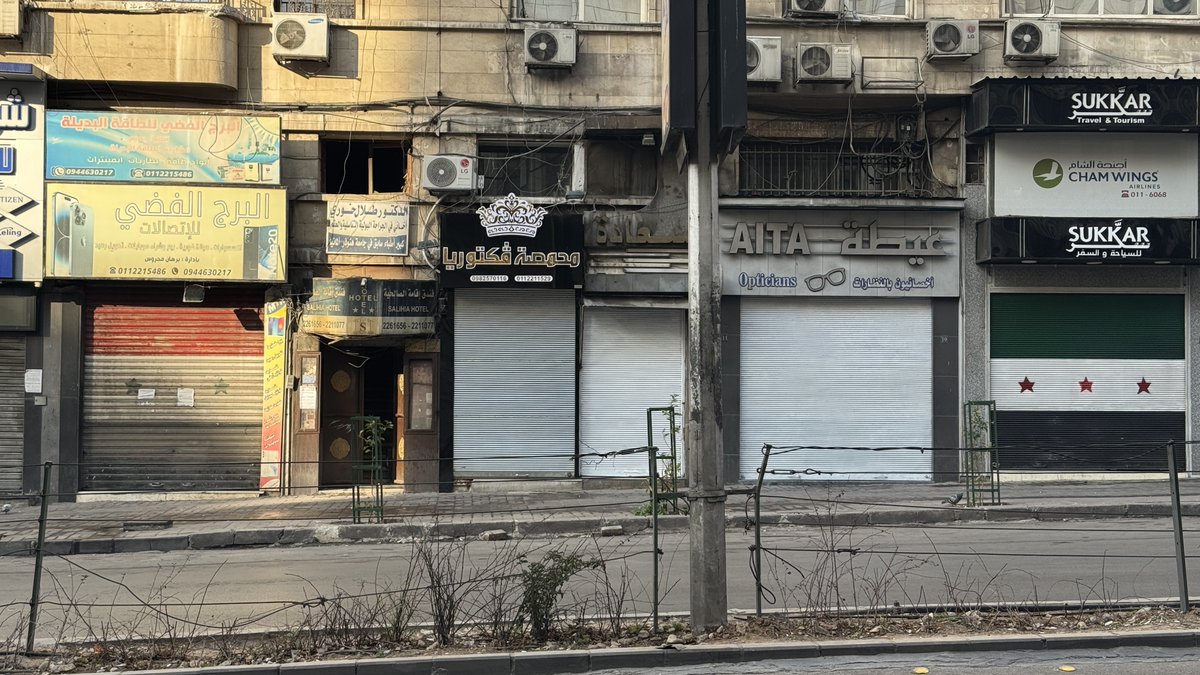
1️⃣4️⃣ The best thing, though, is the freedom of expression. Everybody is eager to talk about politics. As I mentioned earlier, I overheard someone in a café say to their friend, “Can you imagine? We are talking about politics openly!” They are even openly criticizing the new government.
However, old reflexes are still there and will likely take time to fade. Many people still lower their voices when discussing politics in public, especially when criticizing the government. During my actual work-related interviews, when the topic turned to the government, most interviewees asked me not to include those parts in my research—or at the very least, not to mention their names.
However, old reflexes are still there and will likely take time to fade. Many people still lower their voices when discussing politics in public, especially when criticizing the government. During my actual work-related interviews, when the topic turned to the government, most interviewees asked me not to include those parts in my research—or at the very least, not to mention their names.
1️⃣5️⃣ Overall, traveling to Syria was an incredible experience and a profound eye-opener. While it’s difficult to say I had a “good time” in a place surrounded by so much suffering, I can selfishly admit that I spent two fantastic weeks—both in terms of work and personal experience.
The food was absolutely delicious—though I was never far from the good old Tourista. Syrian cuisine is truly unmatched. I finally had the chance to try real Syrian madlou’a and halawat al-jebn, though only in Damascus and not the real ones from Hama (sorry, Homs). The views in Damascus were breathtaking.
The people I met were all incredibly kind, from the jihadis-turned-policemen (sorry for my U.S. visa) to the local khoudarji, not to mention antique and furniture sellers, random people in the streets, taxi drivers, and everyone in between.
Though I criticize them a lot, I also met some truly dedicated foreign journalists doing an excellent job under difficult conditions. Most seem to be genuinely committed to making an impact and helping Syrians and Syria.
And one of the best parts—I finally got to meet my Syria-based colleagues in person! That was amazing. I owe them a lot for showing me around and helping me discover their country.
The food was absolutely delicious—though I was never far from the good old Tourista. Syrian cuisine is truly unmatched. I finally had the chance to try real Syrian madlou’a and halawat al-jebn, though only in Damascus and not the real ones from Hama (sorry, Homs). The views in Damascus were breathtaking.
The people I met were all incredibly kind, from the jihadis-turned-policemen (sorry for my U.S. visa) to the local khoudarji, not to mention antique and furniture sellers, random people in the streets, taxi drivers, and everyone in between.
Though I criticize them a lot, I also met some truly dedicated foreign journalists doing an excellent job under difficult conditions. Most seem to be genuinely committed to making an impact and helping Syrians and Syria.
And one of the best parts—I finally got to meet my Syria-based colleagues in person! That was amazing. I owe them a lot for showing me around and helping me discover their country.
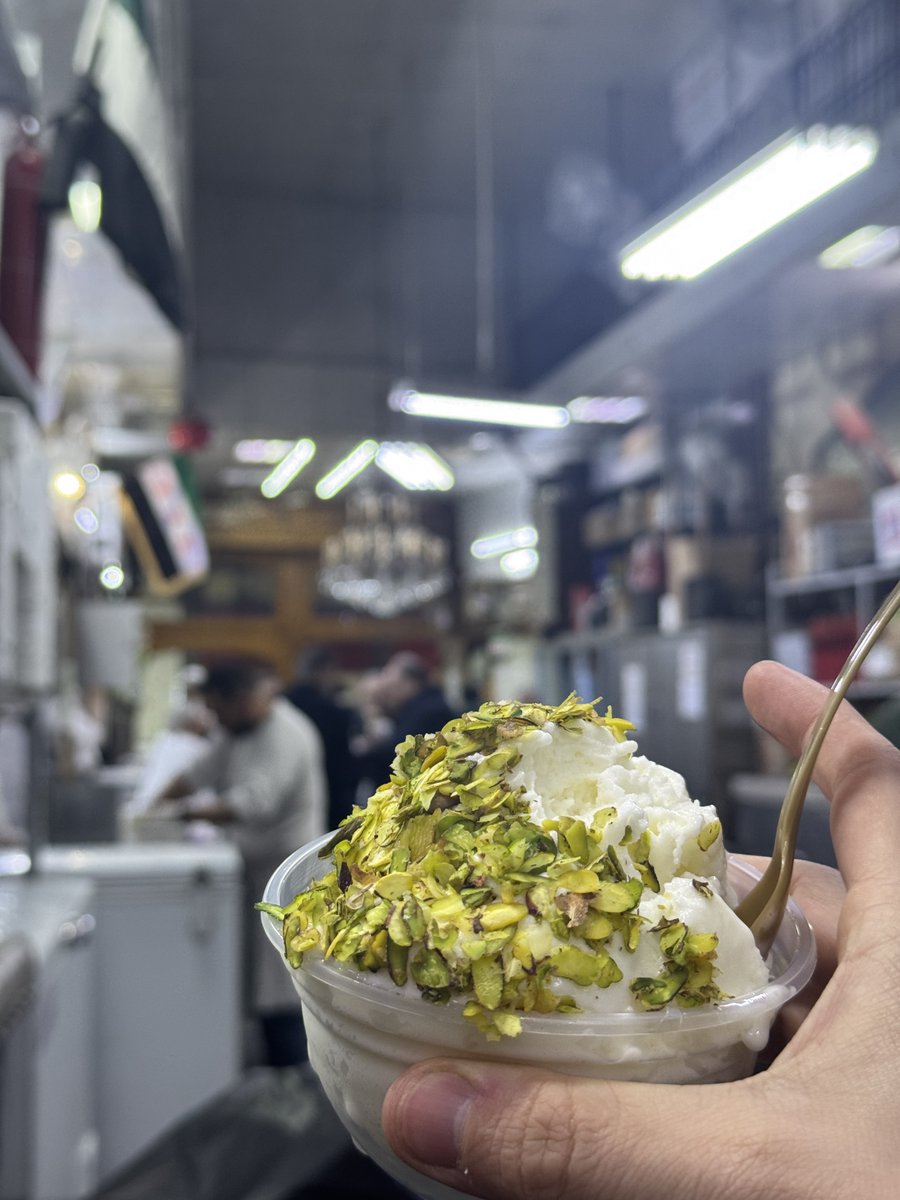
1️⃣6️⃣ Finally, a bit about myself.
I can hardly describe what it felt like to enter Syria. Like many researchers today, I belong to a generation of Syria specialists who never had the opportunity to set foot in the country, leaving me with a lingering sense of illegitimacy in my work. Sure, I’ve read dozens of books about Syria, written hundreds of papers and articles, and met countless Syrians. But can you truly call yourself an expert on a country if you have never visited? I suppose it depends on who you ask, but until now, I had always felt like an imposter working on Syria—especially when speaking with older, more senior researchers who had the privilege of conducting research on the ground before the war. Of course, two weeks in Syria have not radically changed what I know about the country, but still—professionally speaking, there will always be a before and after.
Syria has been at the center of my life for half a decade—perhaps much less than for many other observers, but still. My studies, job, friends, interests, hobbies—everything has been Syria-related. I never thought I would see Syria anytime soon, maybe ever. But that all changed on December 8.
That is why I was emotional that day—not only because of what it meant for my friends and colleagues, with whom I celebrated the collapse of Assad, but also because, selfishly, of what it meant for me. It feels almost ridiculous to make this about myself after everything Syria and Syrians have endured, but those were the thoughts that flooded my mind as I crossed the border, gazing at Syria.
The collapse of the regime has also given me a renewed purpose: contributing to Syria’s reconstruction. Since December 8, I have done little else besides working and talking about Syria.
I am deeply grateful for all that Syria has given me. Now, it is finally time for me to give back. That is why, along with my colleagues, we have been engaging with the private sector, civil society, foreign governments, and international organizations, as well as establishing contacts with the new authorities in Syria—to help foster economic recovery within our line of work.
After everything Syrians have been through, they deserve nothing but the best.
On that note, I really should get back to work now.
I can hardly describe what it felt like to enter Syria. Like many researchers today, I belong to a generation of Syria specialists who never had the opportunity to set foot in the country, leaving me with a lingering sense of illegitimacy in my work. Sure, I’ve read dozens of books about Syria, written hundreds of papers and articles, and met countless Syrians. But can you truly call yourself an expert on a country if you have never visited? I suppose it depends on who you ask, but until now, I had always felt like an imposter working on Syria—especially when speaking with older, more senior researchers who had the privilege of conducting research on the ground before the war. Of course, two weeks in Syria have not radically changed what I know about the country, but still—professionally speaking, there will always be a before and after.
Syria has been at the center of my life for half a decade—perhaps much less than for many other observers, but still. My studies, job, friends, interests, hobbies—everything has been Syria-related. I never thought I would see Syria anytime soon, maybe ever. But that all changed on December 8.
That is why I was emotional that day—not only because of what it meant for my friends and colleagues, with whom I celebrated the collapse of Assad, but also because, selfishly, of what it meant for me. It feels almost ridiculous to make this about myself after everything Syria and Syrians have endured, but those were the thoughts that flooded my mind as I crossed the border, gazing at Syria.
The collapse of the regime has also given me a renewed purpose: contributing to Syria’s reconstruction. Since December 8, I have done little else besides working and talking about Syria.
I am deeply grateful for all that Syria has given me. Now, it is finally time for me to give back. That is why, along with my colleagues, we have been engaging with the private sector, civil society, foreign governments, and international organizations, as well as establishing contacts with the new authorities in Syria—to help foster economic recovery within our line of work.
After everything Syrians have been through, they deserve nothing but the best.
On that note, I really should get back to work now.
• • •
Missing some Tweet in this thread? You can try to
force a refresh




